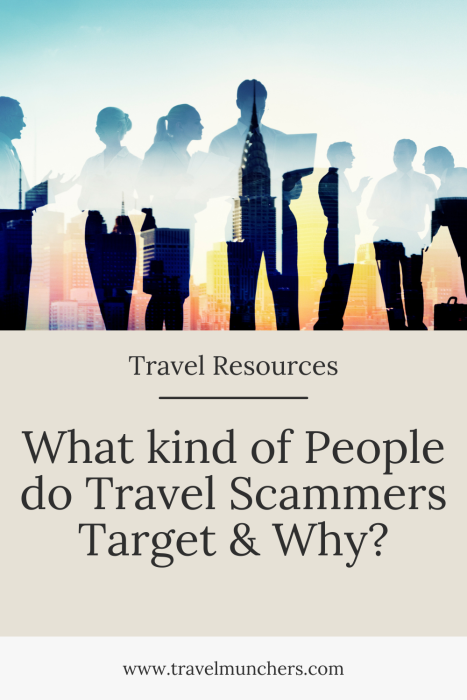What Kind of People do Travel Scammers Target and Why?
What Kind of People do Travel Scammers Target and Why?
Travel scams have become increasingly prevalent as more people embark on vacations and business trips around the globe. With the rise of digital booking platforms and the ease of online transactions, scammers have found new ways to exploit travelers. Common scams include fake travel deals, phishing emails posing as reputable travel agencies, and fraudulent vacation rental listings. According to recent studies, travel-related scams have seen a significant uptick, particularly during peak travel seasons and holidays. This growing trend underscores the need for travelers to remain vigilant and informed. By understanding the various types of scams and employing proactive measures, such as verifying the legitimacy of bookings and protecting personal information, travelers can better safeguard themselves against these pervasive threats. Let’s learn more about who travel scammers target and how you can avoid falling into the trap.
Different Types of Travel Scams
Why do Travel Scammers Target These Groups?
How To Prevent Yourself from Becoming a Travel Scammers Target
In a Rush? Pin it to Read Later!

Copyright Notice: All material on this travel blog site is the sole property of Travel Munchers. This includes blog posts, pages, design and all photos (whether watermarked or not). Any use of materials from this site without express written consent will be considered copyright infringement.
Disclaimer: Some items contain affiliate links and I will get a small commission at no additional cost to you. I really appreciate your support if you like my recommendations!
Understanding Travel Scammers
Travel scammers are individuals or groups who exploit travelers by employing deceptive tactics to steal money or personal information. They operate through various channels, including fraudulent websites, fake travel agencies, and phishing emails.
Their strategies often involve creating seemingly irresistible offers, such as deeply discounted vacation packages or exclusive deals, to lure victims into providing sensitive details or making payments.
Scammers may also impersonate legitimate companies or use sophisticated phishing techniques to gain access to personal accounts. They often exploit the urgency and excitement associated with travel planning to reduce the likelihood of thorough verification.
Understanding how travel scammers operate and recognizing their common tactics can help travelers avoid falling victim to these scams and ensure a safer, more secure travel experience.
Different Types of Travel Scams
Travel scams come in various forms, each designed to deceive and exploit unsuspecting travelers.
Common types include fake bookings, where scammers create fraudulent websites or ads offering non-existent accommodations or flights, tricking individuals into paying for services they will never receive.
Phishing scams involve deceptive emails or messages that appear to be from legitimate travel companies, aiming to steal personal and financial information by tricking recipients into clicking malicious links or providing sensitive data.
Identity theft is another serious issue, where scammers may gain unauthorized access to personal information, such as passport details or credit card numbers, and use them for fraudulent activities.
Recognizing these different types of travel scams and understanding their tactics is crucial for travelers to protect themselves and avoid falling prey to these malicious schemes.
Who Do Travel Scammers Target?
First-Time Travelers
Why first-time travelers are vulnerable.
First-time travelers are particularly vulnerable to scams due to their lack of experience and unfamiliarity with common travel practices and potential pitfalls. Their excitement and eagerness to explore new destinations can make them less cautious and more susceptible to misleading offers or deceptive tactics.
Often, first-time travelers may not be aware of typical scams, such as fake travel agencies or phishing attempts, and may lack the knowledge to spot red flags. Additionally, they might not be familiar with local customs and safety measures, making them easy targets for opportunistic scammers.
Understanding these vulnerabilities and taking proactive steps to educate themselves about potential risks can help first-time travelers avoid falling victim to scams and ensure a safer, more enjoyable trip.
Common tactics used to target them.
Common tactics used by scammers to target first-time travelers include fake booking websites, phishing emails, and fraudulent travel offers that seem too good to be true.
Scammers often create convincing replicas of legitimate booking platforms to trick travelers into entering personal and financial information. They may also send phishing emails that appear to be from reputable travel companies, asking for sensitive data or urging immediate action to secure a fake offer.
Additionally, scammers might use aggressive sales tactics, such as limited-time discounts or exclusive deals, to create a sense of urgency and pressure travelers into making hasty decisions. These tactics exploit the inexperience and excitement of first-time travelers, making them more likely to fall for deceptive schemes.
Awareness of these tactics and cautious verification of offers can help travelers avoid falling victim to such scams.
Senior Citizens
Seniors are frequently targeted by travel scammers due to several key factors. Many seniors have accumulated savings and are looking for retirement adventures or dream vacations, making them attractive targets for scams promising luxurious travel deals.
Scammers often exploit seniors’ trust and limited experience with online travel booking, leading them to fall for fake offers or phishing schemes.
Additionally, seniors may be less familiar with the latest technology and cybersecurity practices, making them more susceptible to fraudulent websites and email scams. The emotional appeal of travel experiences, coupled with a lack of familiarity with common scam tactics, makes seniors particularly vulnerable to travel scams.
Educating seniors about these risks and encouraging vigilant verification can help protect them from falling victim to such deceptive schemes.
Budget-Conscious Travelers
Budget-conscious travelers are prime targets for scammers due to their heightened sensitivity to deals and discounts.
Scammers exploit this eagerness to save money by offering enticingly low-priced travel packages, accommodations, or flights that seem too good to be true. These fraudulent offers often promise luxury experiences at a fraction of the cost, luring travelers into making hasty decisions without thorough research.
The appeal of unbeatable prices can lead budget-conscious travelers to overlook red flags or skip essential verification steps, making them more susceptible to booking scams, fake websites, or phishing schemes.
To protect themselves, budget-conscious travelers should always verify the legitimacy of travel offers, use trusted booking platforms, and exercise caution when encountering deals that seem unusually cheap.
How scammers use “too good to be true” deals
Scammers frequently use “too good to be true” deals to lure unsuspecting travelers into their schemes.
By advertising extraordinarily low prices on flights, hotels, or vacation packages, scammers create a sense of urgency and excitement that compels individuals to act quickly without conducting proper due diligence. These offers often promise high-value experiences at a fraction of the cost, preying on travelers’ desires for a bargain.
Once individuals make a purchase, they may discover that their booking is either non-existent, significantly different from what was advertised, or a complete scam, leaving them stranded or out of pocket.
To avoid falling victim to such scams, travelers should be wary of deals that seem overly attractive, thoroughly research the legitimacy of the offers, and book through reputable and well-reviewed travel providers.
Solo Travelers
Challenges faced by solo travelers that scammers exploit.
Solo travelers often face unique challenges that scammers are adept at exploiting. The sense of isolation and unfamiliarity with local customs can make solo travelers more vulnerable to deceitful tactics.
Scammers prey on this vulnerability by posing as friendly locals or offering seemingly helpful advice, only to lead travelers into fraudulent schemes. Additionally, solo travelers might be more inclined to accept deals that promise convenience or companionship, which scammers use to their advantage.
The lack of a companion to question suspicious offers or verify details increases the risk of falling for scams. To mitigate these risks, solo travelers should remain cautious, research their destinations thoroughly, and rely on trusted sources for travel advice and bookings.
Common scams that target solo travelers.
Solo travelers are frequently targeted by various common scams that exploit their vulnerability and isolation.
One prevalent scam involves fraudulent accommodation listings, where scammers post attractive deals on rental sites, only to disappear once payment is made.
Another frequent scam is the “friendly local” ruse, where individuals pose as locals offering assistance but later use the situation to steal money or personal information.
Additionally, solo travelers are often targeted by fake tour guides or taxi drivers who overcharge or take them to less reputable establishments. These scams exploit the solo traveler’s lack of local knowledge and support network, making it crucial for them to stay vigilant and verify all offers and transactions through reputable sources.
Last-Minute Planners
How last-minute planning can make travelers susceptible to scams.
Last-minute planning can significantly increase travelers’ susceptibility to scams due to the rush and stress associated with hurried arrangements.
When travelers book flights, accommodations, or tours at the last minute, they often forego thorough research, which makes them more likely to fall for fraudulent offers and deceptive deals. Scammers take advantage of this urgency by promoting “exclusive” last-minute discounts or fake emergency deals that seem too good to miss.
This lack of time for due diligence leaves travelers vulnerable to booking fake services or providing personal information to unverified sources.
To avoid such pitfalls, it’s essential for travelers to plan ahead, research thoroughly, and verify the credibility of all travel-related transactions to protect themselves from scams.
Examples of last-minute scams targeting these travelers.
- Fake Booking Websites: Scammers create counterfeit travel booking sites that look legitimate, offering attractive last-minute deals on flights, hotels, or vacation packages. Travelers who book through these sites may find their payment details stolen or their bookings nonexistent.
- Phony Discount Offers: In the rush to secure a booking, travelers might encounter advertisements for “exclusive” last-minute discounts on social media or email. These offers often lead to fake websites or fraudulent sellers, resulting in lost money and no travel arrangements.
- Emergency Cancellation Scams: Scammers may contact travelers claiming their booking has been canceled due to an emergency or issue, and they need to provide additional payment or personal details to secure a new reservation. This tactic exploits the traveler’s urgency and fear of losing their trip.
- Impersonation Scams: Scammers posing as travel agents or customer service representatives may contact travelers urgently, offering last-minute upgrades or solutions. They often ask for sensitive information or payment details under the guise of fixing a problem with the booking.
- Fake Vacation Rentals: Last-minute travelers looking for rental properties might come across listings that appear too good to be true. Scammers may post attractive properties on rental platforms or social media, only to disappear after the payment is made, leaving travelers without accommodation.
- Travel Insurance Scams: Travelers who haven’t purchased insurance might be targeted with urgent offers for last-minute travel insurance, only to find out later that the policy is fraudulent or doesn’t cover their needs.
Make sure you don’t skip out on travel insurance !
Insurance – Travelers + Nomads
To avoid these scams, it is crucial for travelers to use reputable booking platforms, verify the legitimacy of offers and contacts, and ensure they have sufficient time to review and confirm all details before making any payments.
Why Do Travel Scammers Target These Groups?
Vulnerability Factors
Psychological and behavioral vulnerabilities.
Psychological and behavioral vulnerabilities significantly contribute to travelers falling victim to scams. Scammers often exploit common human tendencies such as urgency, excitement, and trust. For instance, the excitement of planning a trip can lead individuals to overlook red flags and make hasty decisions, especially when faced with “too good to be true” offers.
Additionally, the stress of last-minute travel arrangements can impair judgment, making travelers more susceptible to scams promising quick solutions. The desire for convenience and the trust in seemingly legitimate offers further increase vulnerability.
Scammers use sophisticated techniques to mimic reputable sources, leveraging travelers’ natural inclination to trust authority figures and official-looking communications. Understanding these psychological triggers and exercising caution can help mitigate the risk of falling prey to travel scams.
Lack of experience or awareness.
Lack of experience and awareness are major factors that make travelers more susceptible to scams. Inexperienced travelers may not recognize common signs of fraudulent activity or know how to differentiate between legitimate and deceptive offers. This lack of familiarity can lead to poor decision-making, such as booking through unverified websites or falling for too-good-to-be-true deals.
Additionally, travelers who are unaware of common scam tactics are less likely to take preventive measures, making them prime targets for scammers. Scammers often exploit this gap in knowledge by creating convincing but fraudulent scenarios that prey on the unprepared.
Increasing awareness and educating oneself about common travel scams can significantly reduce the risk of falling victim to such fraudulent schemes.
High Return on Investment
Scammers strategically invest in targeting specific groups because certain demographics are more vulnerable to their deceptive tactics due to their characteristics and circumstances. For example, seniors are often targeted due to their financial stability and perceived trustworthiness, making them prime candidates for fraud schemes.
Similarly, budget-conscious travelers, who are looking for deals and discounts, may be more susceptible to “too good to be true” offers that ultimately lead to scams.
Additionally, solo travelers might be targeted because they are more likely to seek assistance or take risks that can be manipulated by scammers. By understanding the unique vulnerabilities of these groups, scammers can tailor their schemes to exploit specific weaknesses, ensuring higher success rates in their fraudulent activities.
Accessibility
How easy access to personal information makes these groups targets.
Easy access to personal information significantly increases the vulnerability of certain groups to travel scams.
Scammers often exploit the wealth of data available through social media, public records, and online transactions to craft convincing and targeted schemes. For instance, seniors who frequently share personal milestones or travel plans on social media can be easily targeted by scammers who use this information to create tailored phishing attempts.
Budget-conscious travelers, who may search for deals and provide personal details on various travel booking websites, are at risk when their information is compromised or sold to fraudsters.
Additionally, solo travelers may inadvertently reveal their travel itineraries and preferences, making it easier for scammers to tailor their attacks.
This accessibility of personal information enables scammers to execute more believable and effective scams, underscoring the importance of safeguarding one’s data while traveling.
The role of social media and online platforms in identifying targets.
Social media and online platforms play a pivotal role in how scammers identify and target potential victims.
Scammers utilize these digital channels to gather personal information, such as travel plans, locations, and interests, which are often shared openly by users.
For example, travelers who post their itineraries, vacation photos, or personal details on platforms like Facebook, Instagram, and Twitter make themselves easy targets for scams. Scammers can monitor these platforms to identify individuals who may be vulnerable to fake deals, phishing schemes, or fraudulent offers.
Additionally, online forums and travel groups can inadvertently expose users to scams if they share too much personal information or engage in discussions that reveal their preferences and habits. This makes it crucial for travelers to be cautious about what they share online and to be aware of how their digital footprint can be exploited by scammers.
How to Prevent Yourself from becoming a Travel Scammers Target
Tips for All Travelers
General safety tips and precautions.
When it comes to ensuring safety while traveling, following general safety tips and precautions is crucial for avoiding scams and staying secure.
- Always research your destinations thoroughly and be cautious when booking accommodations or activities through unfamiliar websites.
- Use reputable sources and verify the legitimacy of travel services before making payments.
- Additionally, safeguarding your personal information is essential; avoid sharing sensitive details on unsecured or public platforms.
- While traveling, remain vigilant and skeptical of deals that seem too good to be true, as they are often red flags for scams.
- Regularly update your passwords and use two-factor authentication for your online accounts to protect against unauthorized access.
- Finally, keep a copy of important documents, such as passports and travel insurance, in a secure location and consider registering with your embassy in case of emergencies.
By adhering to these safety tips, travelers can significantly reduce their risk of falling victim to scams and ensure a safer, more enjoyable trip.
Importance of researching and verifying travel deals.
Researching and verifying travel deals is essential to avoid falling prey to scams and ensure a smooth travel experience. Before committing to any travel offer, take the time to investigate the credibility of the provider by reading reviews from past customers and checking their reputation on trusted platforms.
Cross-reference deals with multiple sources to confirm their authenticity and avoid offers that seem unusually cheap or too good to be true. Utilize official travel websites and established travel agencies to book flights, accommodations, and activities.
Additionally, verify the legitimacy of the website or service by checking for secure payment options and reading their cancellation and refund policies. By thoroughly researching and verifying travel deals, you can protect yourself from fraudulent schemes and make informed decisions that lead to a safe and enjoyable trip.
Specific Tips for Vulnerable Groups
Research Thoroughly:
- Verify Providers: Research travel agencies, hotels, and tour operators to ensure they are reputable. Read reviews on trusted sites like TripAdvisor or Yelp.
- Check for Scams: Look up any red flags or recent complaints about the provider.
Book Through Trusted Platforms:
- Use Official Websites: Make bookings through official or well-known travel websites and platforms.
- Avoid Unknown Sites: Steer clear of unfamiliar websites offering deals that seem too good to be true.
Be Cautious with Emails and Messages:
- Watch for Phishing: Do not click on links or open attachments from unknown or suspicious emails.
- Verify Offers: Contact companies directly using verified contact details to confirm any offers or deals.
Secure Personal Information:
- Use Strong Passwords: Create strong and unique passwords for online accounts and travel bookings.
- Protect Your Data: Avoid sharing personal information on public Wi-Fi or unsecured networks.
Confirm Reservations:
- Double-Check Details: Confirm all travel bookings and reservations with the provider directly before departure.
- Get Confirmation: Ensure you receive and keep confirmation emails or documents for all bookings.
Beware of Too-Good-to-Be-True Deals:
- Scrutinize Discounts: Be wary of offers that seem excessively discounted or unusually cheap.
- Research Market Rates: Compare prices with other reliable sources to gauge if an offer is legitimate.
Avoid Last-Minute Decisions:
- Plan Ahead: Avoid making travel plans or bookings in haste, as last-minute deals are often scams.
- Allow Time for Research: Give yourself ample time to research and confirm travel arrangements.
Use Credit Cards Wisely:
- Prefer Credit Over Debit: Use a credit card for bookings as it often provides better fraud protection.
- Monitor Statements: Regularly check your credit card statements for any unauthorized transactions.
Trust Your Instincts:
- Question Unusual Requests: Be cautious if a provider asks for unusual payment methods or personal information.
- Seek Advice: Consult with experienced travelers or travel advisors if something doesn’t feel right.
Stay Informed:
- Follow Travel Advisories: Keep up-to-date with travel advisories and safety information for your destination.
- Join Travel Forums: Participate in travel forums to gain insights and warnings from fellow travelers.
Red Flags to Watch For
Common signs of travel scams.
When evaluating travel offers or communications, being aware of common red flags can help you avoid falling victim to scams. Here are some key warning signs to watch out for:
Unrealistic Offers:
Deals that seem too good to be true, such as luxury vacations at a fraction of the price, should be approached with caution. Scammers often use enticing offers to lure victims.
Pressure Tactics:
Scammers may create a sense of urgency, pressuring you to act quickly or make immediate payments. Be wary of high-pressure sales tactics that push you to make hasty decisions.
Lack of Contact Information:
Legitimate companies will provide clear contact details, including a phone number, email, and physical address. Be cautious if you can’t find verifiable contact information or if communication is only through unofficial channels.
Poor Website Quality:
Check the professionalism of the website. Scammer websites often have poor design, broken links, and spelling or grammatical errors. Verify the website’s URL and look for secure connection indicators like HTTPS.
Unusual Payment Methods:
Be skeptical if asked to pay via unconventional methods, such as wire transfers, gift cards, or cryptocurrencies. Trusted travel companies typically use secure payment methods and credit cards.
Lack of Reviews or Testimonials:
Search for reviews or testimonials from other travelers. Scammers often lack credible reviews or have fake testimonials. Look for feedback on independent review sites.
Requests for Personal Information:
Be cautious if asked for sensitive personal details, such as your Social Security number, passport information, or banking details, especially if it’s unsolicited.
Overly Vague Information:
Scammers often provide vague details about the travel offer, such as unclear itineraries, non-specific locations, or generic descriptions. Seek comprehensive information and clarification.
Inconsistent Communication:
Scammers may use inconsistent or unprofessional communication. Look for signs of inconsistent email addresses, phone numbers, or communication styles that deviate from standard business practices.
Too Good to Be True Testimonials:
Be wary of testimonials that are overly positive and lack detail. Authentic reviews provide balanced feedback and specific experiences.
What to do if you suspect you’re being targeted.
If you suspect you’re being targeted by a travel scam, it’s crucial to take immediate action to protect yourself and mitigate potential damage.
First, cease all communication with the suspected scammer and avoid providing any personal or financial information. Contact your bank or credit card company to alert them of the situation and request that they monitor for suspicious activity or issue a new card if necessary.
Report the incident to relevant authorities or consumer protection agencies, such as the Federal Trade Commission (FTC) or local law enforcement, to help prevent others from falling victim to the same scam.
Additionally, inform the platform or service through which you were contacted, as they may have procedures in place to handle fraudulent activity. Document all interactions and evidence related to the scam for future reference. By taking these steps, you can help safeguard your personal information and contribute to broader efforts in combating travel fraud.
Need More Travel Tips?
💳 WANT TO TRAVEL FOR FREE?
Want to travel for free, simply as a reward for spending money you already had to spend ? I love my Capital One travel card and I think you will too! You get unlimited miles on every purchase with a card that fits your lifestyle. Plus 10x points on hotels and 5x points on flights booked through their travel portal!!! If you ever wanted to travel in luxury, this is the card for you. Check out our referral link!
🧳 NEED TRAVEL INSURANCE?
Peace of mind comes when you book travel insurance. You do not need to worry about flight cancelations, lost luggage, or any illnesses while traveling. Check out the first ever specific Digital Nomad insurance we use here : SafetyWing. ETKA, Vistors Coverage , or Insubuy.
NEED AN eSIM?
Check out our article on the top eSIM Providers for Digital nomads and world travelers:
Top eSIM Providers for Digital Nomads: Streamlining Connectivity While Traveling
NEED a Rental Car?
Check out the best options for renting a car for your trip to give you more freedom and flexibility while you travel ! Check out Rent A Car here.
Want Lounge Access when Flying?
If you want access to over 1,500 lounges in 600 locations then you need to check out Priority Pass!
Happy travels xx
Like it? Pin it!

Follow our adventures on social!
Copyright Notice: All material on this travel blog site is the sole property of Travel Munchers. This includes blog posts, pages, design and all photos (whether watermarked or not). Any use of materials from this site without express written consent will be considered copyright infringement.










One Comment